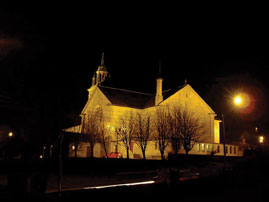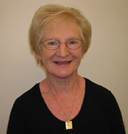
Suicide and the Needs of the Suicide Bereaved.
|
On
30th April last, with Gobnait O'Grady, I attended a one-day workshop
on 'Suicide and the Needs of the Suicide Bereaved”, facilitated
by The Irish Hospice Foundation. The purpose of the day was to give
pointers and guidelines based on diligent and sensitive research.
The workshop was attended by people from around the country involved
in areas such as occupational therapy, psychotherapy, teaching, research
and counselling. We discovered, however, that approximately one third
of the participants were, like us, volunteer members of Bethany Bereavement
Support Group.
The following are examples of what we explored during the day’s
training:
• Understanding Suicide: it challenges the value of life.
• Causal Factors: self image, entrapment, feeling a burden.
• Grief of the Bereaved: it goes beyond normal grieving.
• Responding to the bereaved: need to identify their place in the bereavement
eg. relative,
friend, colleague.
Grief
beyond all other grief.
With the intentional taking of one's own life the grief of the suicide
bereaved is always going to be 'grief beyond all other grief, 'grief
that knows no boundaries', 'sorrow that goes beyond sorrow'.
In addition to the normal grieving process, the suicide-bereaved suffersadditional
reactions:
Trauma, Stigma, Horror, Isolation, Secrecy, Loneliness, Blame, Failure,
Guilt, Regret, Anger, Shock, Explanations that search for answers.
In understanding suicide we are challenged in several areas - the value
of life, our own individual lives and life in general. As suicide defies
our cherished notion that all life is sacred, it creates unease and challenges
our most deeply held beliefs.
The suicide-bereaved also have to face unavoidable events that weigh
heavily on them such as funeral arrangements, investigation, post-mortem,
inquest. Not alone do they struggle with their own grief and reaction,
they also struggle with society's reaction. There can be people around
them who may not be sensitive, they have to face the legal situation,
loss of income, property and insurance matters.
Questions arise - will someone else seek to follow the same path?
And perhaps most important of all, the spiritual question:
What has happened to their loved ones - are they saved? are they lost?
Will they meet again?
Need for Forgiveness.
The suicide-bereaved can often struggle with feelings of anger at the
person who has died - anger at having been propelled into such a public
place, having to make funeral arrangements, convey the news, etc...
Sometimes there is resentment, a feeling that the deceased loved one
has left and gone to a better place but those grieving have been left
with a difficult situation to live in. They can find it very difficult
to forgive.
How
Bethany approach may help.
As we journey with those bereaved by suicide we are privileged to be
with them in their Bethany place. When there is no one to understand,
in Bethany there is. As we listen to the bereaved expressing their
anger, guilt, fear, their awful pain of loss, we remember that Bethany
is so named because Jesus, Mary and Martha met and grieved there at
the death of Lazarus and it was at Bethany that Jesus restored life
to Lazarus and in faith He will restore life to all who come to Him.
In Bethany there is no stigma, no social disgrace, no judgement. The
suicide-bereaved are accepted just as they are, with no pressure to “get
over” their grief – we know mourning of the heart cannot
be hurried or rushed. As a Bethany volunteer, listening to the suicide-bereaved,
it can help to remember we are in the company of Jesus who seeks to save,
comfort, console the loved one who has died by suicide and whose heart
He understands. He also seeks to save, comfort and console those bereaved
by suicide and whose loss He understands.“His power to save is
utterly certain, since He is living forever to intercede for all who
come to God through Him” Hebrews 7:24-25
Carmel Roberts
![]()
|
Freedom to Forgive
In
May of this year, our Bethany Day of Reflection took place in Clonliffe.
Over fifty
members attended and found it an inspiring
day. It was delivered by Father Flann Lynch, O.f.m .cap. who encouraged
us to avoid the negative world of scarcity, struggle and guilt so as
to embrace awareness of God’s abundant life. He drew our attention
to the importance of forgiveness in the grieving process and encouraged
us to try the following sacred ritual as a way of finding inner freedom:
No
matter our difficulty in forgiving, or how deep seated our anger or resentment,
we can take steps to achieve freedom. Hidden feelings are often the underlying
cause of the difficulty. Find a good listener, someone you can trust,
and explore these feelings, bringing them to the surface, making, them
conscious. A safe atmosphere is essential. Talk about your feelings and
your fear of looking at them. Try to name the feelings. Keep talking
and feeling as you try to make the feelings conscious.
A powerful and
sacred ritual: Find a quiet place where you will not be disturbed. Light
a candle and spend a little while letting it speak to you of the presence
of Christ the Light, helping you. Then write spontaneously, allowing,
your feelings to surface. Write whatever comes to mind. Do not reflect
as you write or read over what you have written. Stay in touch with what
you are feeling.
When you have written all you can, burn the page(s) from
the flame of the candle. Let the ash fall into a wash hand basin with
a white surface. Be aware of the flame of the candle representing the
flame of God's love, burning away the poison of anger and bitterness,
as well as healing your woundedness.
When the burning is complete turn
on the tap and observe the water removing all the ash. Let the water
remind you of the ongoing power of the water of baptism, cleansing you
of the venom of bitterness and resentment you have written, as well as
healing you and empowering you with the freedom of mercy and forgiveness.
When all the ash has disappeared observe the white, clean surface of
the basin. Let it remind you of how clean and pure you have become. Repeat
this ritual daily until there is nothing more you can write. Do the exercise
whenever old hurts resurface or new ones occur. Conclude with a silent
prayer of deep reverence and gratitude to God.
Adapted
from book “Vision
Companion”
News
Flashes................. Donation to GEC Our treasurer Ronan wishes to remind those groups with adequate funds to make their 50euro contribution to the GEC as soon as possible. The Orlagh Retreat The Bethany retreat weekend will take place in Orlagh house from the 19th to the 21st of November 2010. Clients and members who have been bereaved for more than 18 months may find this a very healing process. Group funds may be used to pay for those wishing to attend. Making use of your newsletter Groups wishing to promote a speaker make an announcement or write an article should get in touch with bethanysupport@eircom.net. |
Members of the General Executive
for 2010:
Myles O'Reilly SJ
(Spiritual Director),
Winnie Keogh (Chairperson),
Moira Staines (Secretary),
Ronan Hughes (Treasurer), Anne Butler, Brendan Nugent, Mary Mason, Deirdre Ó Muirí,
Gobnait O'Grady.
For further information please contact: Bethany Bereavement Support Group,
c/o Rathfarnham Parish Centre, Willbrook Road, Rathfarnham, Dublin 14.
Bethany Phone: 087 9905299
Email: bethanysupport@eircom.net
Website: www.bethany.ie
![]()
MINISTERING
TO THE BEREAVED
Bethany
Mount Merrion
 At
the invitation of the parish priest Fr. Pat McManus and following
the normal application
and interview procedures, two parishioners undertook the Bethany
training ourse in
Monkstown Parish Centre during Autumn 2005. Another two parishioners
joined one year later. Since then a few people were approached and
invited to consider this ministry, others expressed interest, some
applications were made and interviews held, but without any increase
in personnel.
At
the invitation of the parish priest Fr. Pat McManus and following
the normal application
and interview procedures, two parishioners undertook the Bethany
training ourse in
Monkstown Parish Centre during Autumn 2005. Another two parishioners
joined one year later. Since then a few people were approached and
invited to consider this ministry, others expressed interest, some
applications were made and interviews held, but without any increase
in personnel.
Once set up, as advised we have dedicated Bethany telephone numbers
and have availed of financial support from the Family Support Agency,
Earlsfort
Terrace.
We have placed occasional notices in the parish newsletter “Contact”.
Two members have since left; two still remain.
Initially the parish secretary supplied a list of the deceased, with names,
addresses and telephone numbers of the relatives available for contact.
Some six weeks to two months later a letter was sent and possible dates
for a visit suggested. A pamphlet and the Bethany prayer were included,
and the dedicated Bethany telephone numbers were supplied.
In some cases there was no response. In other cases responses tended to
be a phone-call appreciating the letter of condolence and gratefully declining
a visit because the bereaved was coping and had adequate support. Sometimes
this phone-call, both in content and duration, replaced a visit!
On a number of occasions visits were arranged which seemed to be helpful.
At times we were contacted by an outside party (parish secretary, mutual
acquaintance, concerned neighbour or family member, etc.), where “delayed
reaction” had set in, and after initially coping well for some time,
even one or two years later, grief struck suddenly. A few phone-calls,
and in one case a visit, seemed to help.
In one area we recently departed from standard procedure. When the deceased
had been a parishioner, but the named person for contact not resident in
Mount Merrion, a letter of condolence was sent, with the usual pamphlet,
Bethany prayer and included a list of the Bethany Support Groups where
support would be available if required.
We still receive the up-to-date lists of deceased from the parish secretary,
and make contact with named next-of-kin, after a period of about six weeks
to two months later. We attend the AGM, occasional Reflection Days, relevant
assemblies; but with two members the field work tends to be intermittent
and limited.
Both Bethany members are part of the Parish Funeral Ministry Service, recently
set up and this overlap needs careful monitoring.
Paddy McGinnity


